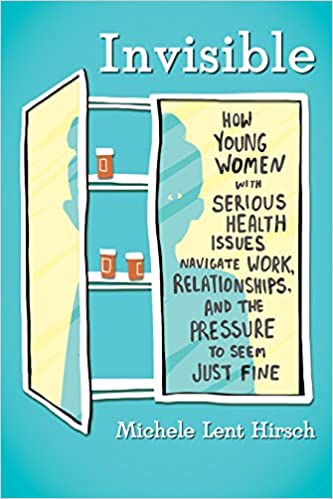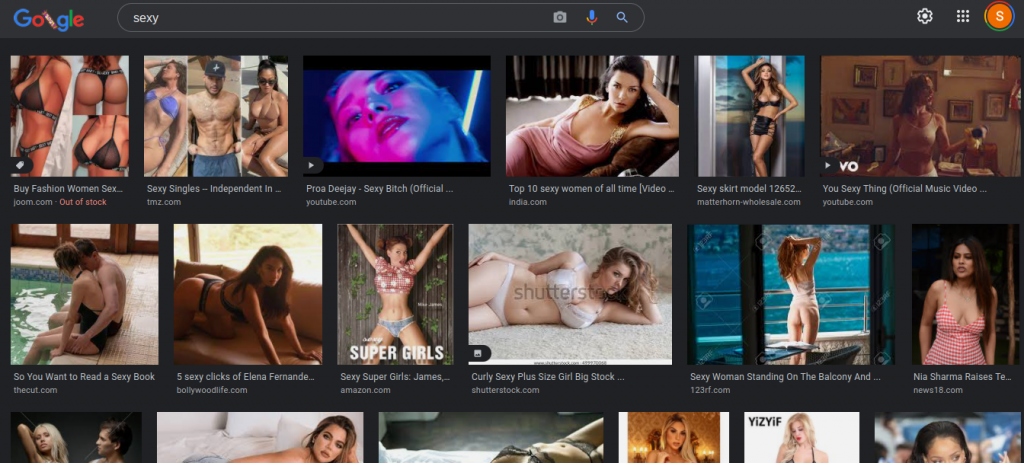I’ve been spending much of this December relaxing and recuperating from a deviated septum surgery, which was thankfully not as bad as I thought it could be. There’s been a lot of sweatpants, mood lighting, remote meetings, nasal sprays, dog hair, pajamas, hot tea, videogames, and movie marathons. And as I wrap up the year, and prepare for the next, I have a year-end reflection to posit on.
I’ve been reading Michele Lent Hirsch’s incredible book, Invisible: How Young Women with Serious Health Issues Navigate Work, Relationships, and the Pressure to Seem Just Fine, to prepare for a book club I am facilitating on January 9. And what a great and important read!

Too often young women are diagnosed with or managing chronic health conditions, and our culture turns a blind eye to this being a possibility, leaving a large section of the population feeling alienated, distressed, and left behind. Not only do chronic medical conditions affect these folks’ lives, work, relationships, friendships, and hobbies, but the manner in which our culture has little guidance on how to deal with such things can exacerbate this negative impact, contributing to a lack of awareness, self blame and doubt, and dismissiveness that can ripple out and harm folks managing health conditions and those in their orbit.
Speaking in more broad terms, I’ve had many conversations with women this year about their relationships and their sexuality. And resoundingly, I’ve heard a similar vein from many of these women, saying, “I don’t feel sexy. I don’t feel sexual, or like a sexual being. I don’t even know what that feels like anymore, or what that means.” And in reading this book expanding on the ways that women managing chronic conditions can have difficulties with their sexual identity, I’m reflecting on the damage that having such a narrow cultural script on what “sexy” or “sexual” is, is doing to folks of all backgrounds and genders.
“Sexy” is a cultural prescription for women, a badge of honor or a scathing insult, depending on the context. A thing one should desperately want to be but not ever a thing that one should have to try to be. It can be a compliment from a lover, or an unwelcome invitation by a harasser. It can be used to describe one’s sexual atractiveness, appearance, demeanor, behavior, or unfortunatey, one’s perceived value as a woman. It can be majorly influenced by one’s audience, culture, age, race, sexuality, or gender, among other things. The label has major implications on confidence, self-esteem, and self-image.
I’ve had the word wielded against me: an unwelcome and unsafe-feeling comment by a college professor, a withheld descriptor by an unhealthy partner (“Well, you’re cute but you’re not what I’d call sexy”), a judgment thrown by a person in power over me trying to determine my moral righteousness. And I’ve had the word used as a compliment of sorts from welcome parties, as if to say, “You are attractive, desirable, confident, someone I want to be closer to.” I remember learning what the word meant probably as a kid when viewing those “People Magazine’s Sexiest Man Alive” covers and feeling like the word was gross and improper because it was built upon the ol’ s-e-x. And now as an adult, and a person in the world, it feels like a troublesome label that is hard to separate from the contexts in which I first learned and experienced it.
What does it mean, though? I’m finding it is hard to define the word “sexy” absent of its context. And most often, the context I experience it in is women talking down on themselves, holding themselves to a standard even they are unsure of.

Impacts on sexual self-esteem
It seems there’s a lot that can impact someone feeling as though they can nest themself in the “sexy” circle of the Venn diagram or not, including, but not limited to —
- Media: When I grew up, we complained of magazine covers, airbrushing, and plastic surgery as giving young women unrealistic standards of beauty. Now, one can just log into instagram or whatever to be treated to millions of women, including women they know personally, altering their appearances to fit with aesthetic beauty norms that dominate our current culture. It’s hard to feel “sexy” if you’re not rocking the waist-to-hip ratio you see on every woman in popular media, or can see the oh-so-human pores on your nose, or have to manage your stubbly body, or go through “real life shit” you aren’t treated to on social media. Our media paints a portrait of what the “right” way to be sexy and sexual are, and it is extremely narrow. It’s by design: capitalism thrives off of us feeling like crap, so we buy products to make us feel less like crap. I think of that bit on what gets you to buy shampoo; it’s the shampoo label that insults you the most. “For dry, broken, dyed, crappy-ass hair” — isn’t that the one that you need the most?!
- Cultural scripts of Madonna/Whore Complex: You’ve probably heard of this or are familiar with it as a script in our culture perhaps without ever hearing it named as such. The general gist is, women can be one of two ways: either a good girl who is wholesome, homey, caring, nurturing, motherly, plain or beautiful, and asexual; or a bad girl who is objectified, sexual, dirty, mysterious, tempting and very hot. It’s very difficult to cross the threshold from one to the other. If you’ve been raised in a culture where this is a script (and it is in our culture), it can be very hard to feel hot, desirable, and sexual or sexy, if one is viewed as sweet and cute, or has become a mother, or who strongly identifies with other “good girl” labels. The flip side of this is that women who do fall into the sexy (read: whore) side of the Venn diagram are often objectified, met with violence, and discounted. So while there is a draw to be viewed as sexy (“I am desirable! Attractive! Lookin’ good!”), there is also a great danger that can accompany it which is disincentivizing. Which brings me to my next point —
- Sexuality equating danger: It’s staggering, if you have conversation with women in our culture and ask them the first time they’ve been objectified or experienced sexualization (sexual violence) from others — most often it begins in childhood. So this point stands for all folks who identify or have identified as female, and who have experienced acts of sexual violence or not, that being seen as a “sexy woman” or goodness forbid a “sexy girl” adds a layer of potential for violence or unwanted sexualization that is not desired. Unfortunately, stepping out in one’s “ho clothes” is often accompanied by a curling of fear in the abdomen, a need to look over one’s shoulder, an exhalation of “Wow, I feel brave to do this!” In the culture of “What were you wearing?” as a response to sexual assault, being seen as “sexy” comes with danger, or blame, and therefore may be a label that feels unconsciously safer to avoid.
- Relationship status: Unfortunately, this feels like the side effects of the pill bottle that says, “May cause insomnia, or excessive sleep,” and you’re like how the heck can it do both?! But women can feel less-than-sexy because they are not involved in a relationship (“Why does no one like me?? Must be because I’m ugly and undesirable.”) or because they are in a relationship (“I’m too comfortable, they see me naked all the time, they saw me throw up that one time, they see me in sweats, I’m just mom now, ugh.”).
- Medical and real-life shit: In keeping with the above media theme, not enough media representations allow women to be sexual or sexy and also deal with the realities of living in a human body. Periods, chronic pain, pain with sex, differing levels of ability, gastrointestinal stuff, the way real people look without filters or makeup, angles, changes associated with normal human aging or childbirth, hell, even just the way all stomachs roll up when we sit all squashed up, whatever. Bodies are gonna be bodies. Falling down a bunch of stairs and destroying some discs in my back didn’t just vaporize the fact that I was and will continue to be a sexual creature. Someone seeing me from a side angle where I can’t control whether I have a double chin or whatever doesn’t mean that suddenly I am a sexless amorphic blob. Sometimes sex hurts for people. That doesn’t mean they don’t ever want to be sexual or experience sexual pleasure. They are still sexual. They are still sexy. Even if you’re mortified that someone who witnessed you have food poisoning might never want to see you naked again, it’s more likely that that guilt and embarrassment are self-imposed: humans are multifaceted creatures that experience bodily woes and are still sexual.
- Overall self-esteem: This is a big one. If I look at “How do I feel about myself?” nested somewhere in this self assessment will also be this very important part of my personhood, which is my sexuality, my sexual body image, and my sexual self-esteem, among other things. It’s fair to say if one is dealing with poor self-esteem in one avenue, it will likely bleed over into sexual self-esteem as well. If a person is like, “Nobody deserves to be burdened by knowing me,” it’s fair to say they likely aren’t feeling like a sexy creature. Sometimes healing one’s whole self is necessitated to begin to tap into those positive aspects of sexuality and pleasure.
This brings us to what is necessitated by this exposition. “OK, I read this, and it does feel familiar. Now what?”

Redefining what it is to be “Sexy”
If I’ve suffered a long and agonizing divorce of myself from my sexuality, and cannot even fathom what it would feel like to be considered as a “sexy” human being, it is first important to consider the above. Where did this come from? By analyzing the cultural scripts around sexuality that I’ve been exposed to, I can create some distance between my own personal definition of “sexy” versus the one I’ve been told to believe by society. Having this distance allows me to zoom out and realize that this definition is culturally constructed, and therefore, I have more control over redefining my own experience of “sexy” or sexual and what it means to me.
A large component of being close to your sexual self — and to me, this closeness perhaps is what I can define as “sexy” — is you granting yourself permission to do so. It can feel silly to interact in this manner, to deconstruct and reconstruct something as taboo as sexuality; maybe you’re sitting here reading this article thinking it’s ridiculous and blushing some. Cool, I get it — I feel silly even writing this stuff sometimes 🙂 Feeling self-conscious, silly, embarrassed, all of these can be part of the process of reconnecting with your sexuality. And that’s OK. First, though, we need to just be able to sit with these feelings, and sit with our experience of poring over our sexuality, before making some headway. Think of it like, we are looking at the map before hiking. We have to be able to see the trail before taking those steps. And it’s better to just sit with the map at first before taking steps if we are feeling overwhelmed, scared, or self-conscious of our abilities. We can just look to begin, and do some thought experiments. We have to in order to take a safe hike and make sure we’ve packed enough water.
As you grow more familiar with these practices, and connecting with sexuality, and your sexual self, some familiarity can grow, and this is a building block of growing that sexual confidence. Continue to expose yourself to sexual contexts: maybe this is by discussing it with peers, completing and reflecting on your sexual history, allowing youself to feel and reflect on sexual pleasure, or consuming sex-positive media. The more you grow accustomed to sexuality topics, whether consuming them, reflecting on them, or participating in conversation or relating about them, the more your confidence in yourself may grow.
Working on general self-esteem is also wildly beneficial in this regard. Challenging and reframing negative beliefs about yourself or your sexuality can serve to improve your sexual relationship with yourself. Asking yourself, “Was this mine or was this given to me?” can be a helpful part of the process (example: “I’m not sexy anymore because I am a mom now,” can be met with “Was this mine or was this given to me? I’ve been led to believe by our culture that my sexual value is in being some single vixen, not a mom.” or “My body has changed from what it was before, but the things I’ve been led to believe about a body’s sexiness were originally from this unrealistic garbage media. What makes me feel sexual pleasure?” or “I’m all touched out from this breastfeeding crap so maybe I can allow myself a break from the pressure of having to do it all and be “very sexy” right now and come back to it later,” or “There’s more aspects about me that can make me feel sexy and confident now, because I created another human being and am strong and can manage my life and others’, how cool is that?”).
It can be helpful to refocus what our definition of sexuality is. Perhaps being “sexy” can be attributed to our body creating feelings of mental or physical sexual pleasure in us. Maybe “sexy” can be focusing on what my body can accomplish. Maybe “sexy” can refer to my ability to feel, or my ability to make others feel good, pleasurable, desirable. Acknowledge and examine your own attraction to others. Perhaps you’re not just like, “Damn, they’re sexy” when presented with visible abs, but maybe more like, when someone carries a box up the stairs for you, or remembers you like chocolate chips in your waffles best, or said something really emotionally intelligent. Maybe the flexible rules of what you find to be sexy can also be applied to you, rather than stringent and unmeetable societal standards of “sexy.”
Accept that you live in many contexts — there is medical me, comfy me, sexual me, work me, getting shit done me, etc. Contexts are changeable; we all wear a bunch of different “hats.” One does not necessarily have to bleed into the other. “Relationship sweatpants” you can exist and transition with “my partner loves me in bed” you. “Mom cleaning up the house” you can exist as well as “I want to receive comfort and be the small spoon” you. “Sex really hurts and I’m exhausted by it” you can also become “I look hot in this outfit” you. Whatever the case. Your sexuality and sexual identity transcend whatever contexts you are existing in presently and whatever labels you place on yourself.
We are worth more than the broad definitions society places on us.